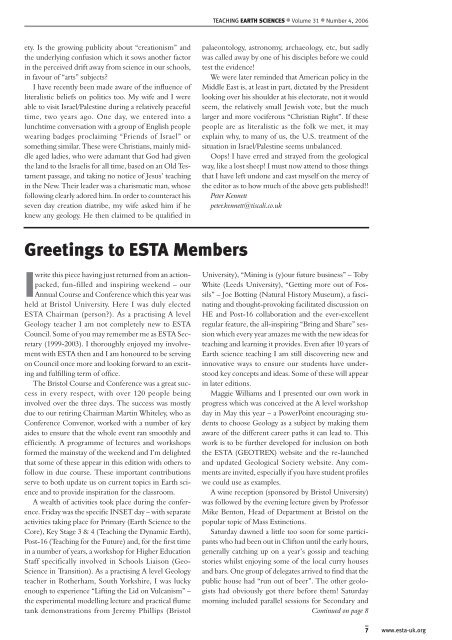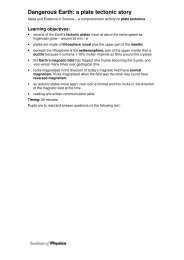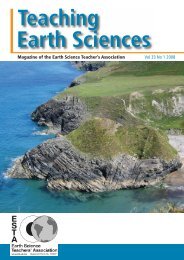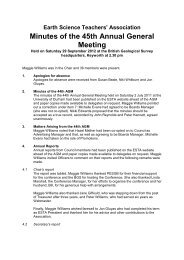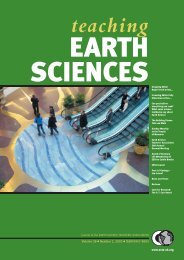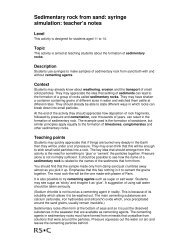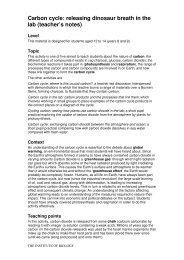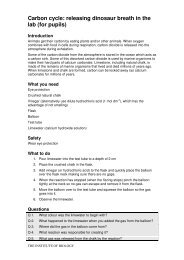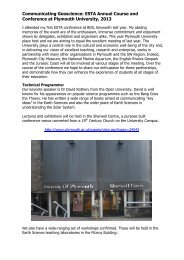teaching - Earth Science Teachers' Association
teaching - Earth Science Teachers' Association
teaching - Earth Science Teachers' Association
You also want an ePaper? Increase the reach of your titles
YUMPU automatically turns print PDFs into web optimized ePapers that Google loves.
TEACHING EARTH SCIENCES ● Volume 31 ● Number 4, 2006<br />
ety. Is the growing publicity about “creationism” and<br />
the underlying confusion which it sows another factor<br />
in the perceived drift away from science in our schools,<br />
in favour of “arts” subjects?<br />
I have recently been made aware of the influence of<br />
literalistic beliefs on politics too. My wife and I were<br />
able to visit Israel/Palestine during a relatively peaceful<br />
time, two years ago. One day, we entered into a<br />
lunchtime conversation with a group of English people<br />
wearing badges proclaiming “Friends of Israel” or<br />
something similar. These were Christians, mainly middle<br />
aged ladies, who were adamant that God had given<br />
the land to the Israelis for all time, based on an Old Testament<br />
passage, and taking no notice of Jesus’ <strong>teaching</strong><br />
in the New. Their leader was a charismatic man, whose<br />
following clearly adored him. In order to counteract his<br />
seven day creation diatribe, my wife asked him if he<br />
knew any geology. He then claimed to be qualified in<br />
palaeontology, astronomy, archaeology, etc, but sadly<br />
was called away by one of his disciples before we could<br />
test the evidence!<br />
We were later reminded that American policy in the<br />
Middle East is, at least in part, dictated by the President<br />
looking over his shoulder at his electorate, not it would<br />
seem, the relatively small Jewish vote, but the much<br />
larger and more vociferous “Christian Right”. If these<br />
people are as literalistic as the folk we met, it may<br />
explain why, to many of us, the U.S. treatment of the<br />
situation in Israel/Palestine seems unbalanced.<br />
Oops! I have erred and strayed from the geological<br />
way, like a lost sheep! I must now attend to those things<br />
that I have left undone and cast myself on the mercy of<br />
the editor as to how much of the above gets published!!<br />
Peter Kennett<br />
peter.kennett@tiscali.co.uk<br />
Greetings to ESTA Members<br />
Iwrite this piece having just returned from an actionpacked,<br />
fun-filled and inspiring weekend – our<br />
Annual Course and Conference which this year was<br />
held at Bristol University. Here I was duly elected<br />
ESTA Chairman (person?). As a practising A level<br />
Geology teacher I am not completely new to ESTA<br />
Council. Some of you may remember me as ESTA Secretary<br />
(1999-2003). I thoroughly enjoyed my involvement<br />
with ESTA then and I am honoured to be serving<br />
on Council once more and looking forward to an exciting<br />
and fulfilling term of office.<br />
The Bristol Course and Conference was a great success<br />
in every respect, with over 120 people being<br />
involved over the three days. The success was mostly<br />
due to our retiring Chairman Martin Whiteley, who as<br />
Conference Convenor, worked with a number of key<br />
aides to ensure that the whole event ran smoothly and<br />
efficiently. A programme of lectures and workshops<br />
formed the mainstay of the weekend and I’m delighted<br />
that some of these appear in this edition with others to<br />
follow in due course. These important contributions<br />
serve to both update us on current topics in <strong>Earth</strong> science<br />
and to provide inspiration for the classroom.<br />
A wealth of activities took place during the conference.<br />
Friday was the specific INSET day – with separate<br />
activities taking place for Primary (<strong>Earth</strong> <strong>Science</strong> to the<br />
Core), Key Stage 3 & 4 (Teaching the Dynamic <strong>Earth</strong>),<br />
Post-16 (Teaching for the Future) and, for the first time<br />
in a number of years, a workshop for Higher Education<br />
Staff specifically involved in Schools Liaison (Geo-<br />
<strong>Science</strong> in Transition). As a practising A level Geology<br />
teacher in Rotherham, South Yorkshire, I was lucky<br />
enough to experience “Lifting the Lid on Vulcanism” –<br />
the experimental modelling lecture and practical flume<br />
tank demonstrations from Jeremy Phillips (Bristol<br />
University), “Mining is (y)our future business” – Toby<br />
White (Leeds University), “Getting more out of Fossils”<br />
– Joe Botting (Natural History Museum), a fascinating<br />
and thought-provoking facilitated discussion on<br />
HE and Post-16 collaboration and the ever-excellent<br />
regular feature, the all-inspiring “Bring and Share” session<br />
which every year amazes me with the new ideas for<br />
<strong>teaching</strong> and learning it provides. Even after 10 years of<br />
<strong>Earth</strong> science <strong>teaching</strong> I am still discovering new and<br />
innovative ways to ensure our students have understood<br />
key concepts and ideas. Some of these will appear<br />
in later editions.<br />
Maggie Williams and I presented our own work in<br />
progress which was conceived at the A level workshop<br />
day in May this year – a PowerPoint encouraging students<br />
to choose Geology as a subject by making them<br />
aware of the different career paths it can lead to. This<br />
work is to be further developed for inclusion on both<br />
the ESTA (GEOTREX) website and the re-launched<br />
and updated Geological Society website. Any comments<br />
are invited, especially if you have student profiles<br />
we could use as examples.<br />
A wine reception (sponsored by Bristol University)<br />
was followed by the evening lecture given by Professor<br />
Mike Benton, Head of Department at Bristol on the<br />
popular topic of Mass Extinctions.<br />
Saturday dawned a little too soon for some participants<br />
who had been out in Clifton until the early hours,<br />
generally catching up on a year’s gossip and <strong>teaching</strong><br />
stories whilst enjoying some of the local curry houses<br />
and bars. One group of delegates arrived to find that the<br />
public house had “run out of beer”. The other geologists<br />
had obviously got there before them! Saturday<br />
morning included parallel sessions for Secondary and<br />
Continued on page 8<br />
7 www.esta-uk.org


